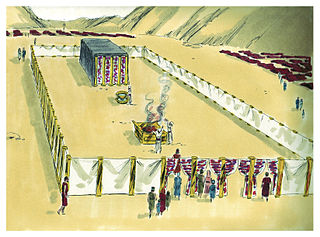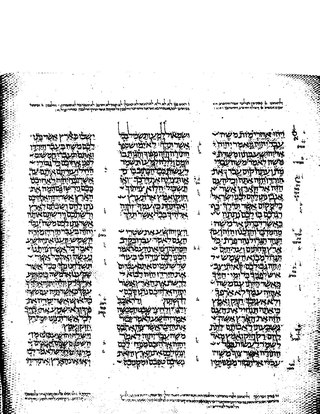
The Samaritan Pentateuch, also called the Samaritan Torah, is the sacred scripture of the Samaritans. Written in the Samaritan script, it dates back to one of the ancient versions of the Torah that existed during the Second Temple period. It constitutes the entire biblical canon in Samaritanism.

Leviticus 18 deals with a number of sexual activities considered abominable, including incest and bestiality. The chapter also condemns Moloch worship. It is part of the Holiness Code, and its sexual prohibitions are largely paralleled by Leviticus 20, except that chapter 20 has more emphasis on punishment.

The Ten Commandments, or the Decalogue, are religious and ethical directives, structured as a covenant document, that, according to the Hebrew Bible, are given by YHWH to Moses. The text of the Ten Commandments was dynamic in ancient Israel and appears in three markedly distinct versions in the Bible: at Exodus 20:2–17, Deuteronomy 5:6–21, and the "Ritual Decalogue" of Exodus 34:11–26.
Isaiah 49 is the forty-ninth chapter of the Book of Isaiah in the Hebrew Bible or the Old Testament of the Christian Bible. This book contains the prophecies attributed to the prophet Isaiah, and is one of the Books of the Prophets. Chapters 40-55 are known as "Deutero-Isaiah" and date from the time of the Israelites' exile in Babylon. This chapter includes the second of the songs of the "Suffering Servant".
Isaiah 54 is the fifty-fourth chapter of the Book of Isaiah in the Hebrew Bible or the Old Testament of the Christian Bible. This book contains the prophecies attributed to the prophet Isaiah, and is one of the Books of the Prophets. Chapters 40-55 are known as "Deutero-Isaiah" and date from the time of the Israelites' exile in Babylon.
Isaiah 62 is the sixty-second chapter of the Book of Isaiah in the Hebrew Bible or the Old Testament of the Christian Bible. This book contains the prophecies attributed to the prophet Isaiah, and is one of the Books of the Prophets. Chapters 56-66 are often referred to as Trito-Isaiah. In chapters 60-62, "three magnificent chapters", the prophet "hails the rising sun of Jerusalem’s prosperity".

Jeremiah 3 is the third chapter of the Book of Jeremiah in the Hebrew Bible or the Old Testament of the Christian Bible. This book contains prophecies attributed to the prophet Jeremiah, and is one of the Books of the Prophets. Chapters 2 to 6 contain the earliest preaching of Jeremiah on the apostasy of Israel. Verses 2:1-3:5 dramatize the ending of a "marriage" between Yahweh and Israel, whereas verses 3:6-4:2 describe "the aftermath of recrimination" and partial restoration.

Jeremiah 19 is the nineteenth chapter of the Book of Jeremiah in the Hebrew Bible or the Old Testament of the Christian Bible. This book contains prophecies attributed the prophet Jeremiah, and is one of the Books of the Prophets.

Jeremiah 25 is the twenty-fifth chapter of the Book of Jeremiah in the Hebrew Bible or the Old Testament of the Christian Bible. This book contains prophecies attributed to the prophet Jeremiah, and is one of the Books of the Prophets. Chapter 25 is the final chapter in the first section of the Book of Jeremiah, which deals with the earliest and main core of Jeremiah's message. In this chapter, Jeremiah identified the length of the time of exile as seventy years.

Jeremiah 28 is the twenty-eighth chapter of the Book of Jeremiah in the Hebrew Bible or the Old Testament of the Christian Bible. The material found in Jeremiah 28 of the Hebrew Bible appears in Jeremiah 35 in the Septuagint. This book contains prophecies attributed to the prophet Jeremiah, and is one of the Books of the Prophets. This chapter contains a confrontation between prophets Jeremiah and Hananiah: Hananiah's false prophecy is responded by Jeremiah's answer, Jeremiah 28:1-9. Hananiah breaks Jeremiah's yoke, Jeremiah foretells an iron yoke, and Hananiah's death, Jeremiah 28:10-17.

Jeremiah 34 is the thirty-fourth chapter of the Book of Jeremiah in the Hebrew Bible or the Old Testament of the Christian Bible. It is numbered as Jeremiah 41 in the Septuagint. This book contains prophecies attributed to the prophet Jeremiah, and is one of the Books of the Prophets. This chapter anticipates the final moments in the assault of the Babylonian army against Jerusalem, when Jeremiah foretold the destruction of the city and the captivity of King Zedekiah, and sharply criticized the treacherous dealings of the princes and people with the slaves that provoked the punishment from God.

Jeremiah 35 is the thirty-fifth chapter of the Book of Jeremiah in the Hebrew Bible or the Old Testament of the Christian Bible. It is numbered as Jeremiah 42 in the Septuagint. This book contains prophecies attributed to the prophet Jeremiah, and is one of the Books of the Prophets. This chapter records the meeting of Jeremiah with the Rechabites, a nomadic clan, in which the prophet "contrast[s] their faithfulness to the commands of a dead ancestor with the faithlessness of the people of Judah to the commands of a living God".

Joshua 1 is the first chapter of the Book of Joshua in the Hebrew Bible or in the Old Testament of the Christian Bible. According to Jewish tradition the book was attributed to Joshua, with additions by the high priests Eleazar and Phinehas, but modern scholars view it as part of the Deuteronomistic History, which spans the books of Deuteronomy to 2 Kings, attributed to nationalistic and devotedly Yahwistic writers during the time of the reformer Judean king Josiah in 7th century BCE. This chapter focuses on the commission of Joshua as the leader of Israel after the death of Moses, a part of a section comprising Joshua 1:1–5:12 about the entry to the land of Canaan.
Textual variants in the Hebrew Bible manuscripts arise when a copyist makes deliberate or inadvertent alterations to the text that is being reproduced. Textual criticism of the Hebrew Bible has included study of its textual variants.
Textual variants in the Book of Exodus concerns textual variants in the Hebrew Bible found in the Book of Exodus.
Textual variants in the Book of Judges concerns textual variants in the Hebrew Bible found in the Book of Judges.
Textual variants in the Book of Genesis concerns textual variants in the Hebrew Bible found in the Book of Genesis.
Textual variants in the Numbers concerns textual variants in the Hebrew Bible found in the Book of Numbers.
There are textual variants in the Hebrew Bible found in the Book of Leviticus.

 : Old Latin / Vetus Latina (list)
: Old Latin / Vetus Latina (list)





